Article
Bazarov T.Yu., Aksenovskaya L.N. (2016). Socio-psychological technology of building entrepreneurial culture of the geographical region representatives in Russia. National Psychological Journal. 4, 87-97.
Abstract
The paper presents the concept of an interdisciplinary project on the development and implementation of socio-psychological technologies of building enterprise culture of the geographical region representatives in Russia. The purpose of this technology is to encourage entrepreneurial activity of the working-age population of a certain Russian geographical region with its cultural, historical, economic and socio-psychological features of the project launches by Professor Takhir Yu. Bazarov «Stolypin reform: version 2.0» and is being implemented in the Saratov region which is historically associated with the name of the prominent Russian reformer Pyotr Stolypin. The project started in the Chernyshevsky Saratov National Research State University in the course of the 7th Scientific Practical Conference «Organizational psychology: people and risks» (October 19-20, 2016) devoted to the interdisciplinary analysis of the reforming practice of the Russian economy within «past – present – future» transspective, leadership in terms of reforms and capacity assessment (socio psychological, cultural, economic) of the Saratov region in the context of more active development of entrepreneurship by establishing the entrepreneurial culture.
The paper describes innovative communication technology organization and promotion of value and target-oriented discussions of scientists, managers and students (among the authors T. Yu. Bazarov and T. A. Nestik are among the authors). The results of socio-psychological research are presented and discussed: a) the image of Saratov city and the image of Saratov entrepreneurs, b) Saratov citizens’ idea about the (ideal and actual) image of Saratov entrepreneurs and Saratov respect of the business selfassessment by entrepreneurs of their image in the eyes of citizens, c) the analysis of the reformer personality and successful leadership in terms of reforms, d) the results of the comparative analysis of the early twentieth and twenty-first centuries crises, e) the results of the research on values and moral development level of the Saratov entrepreneurs, f) on the basis of the obtained results the proposed concept of the development and implementation of socio-psychological technologies of building entrepreneurial culture of the geographical region representatives in Russia.
Accepted: 12/16/2016
Pages: 87-97
DOI: 10.11621/npj.2016.0411
PDF: Download
Keywords: organizational psychology; leadership; facilitative communicative technology; image; entrepreneurship; ethics and value; Saratov region;
Available Online 30.12.2016
Table 1. Comparative characteristics of the Ideal and Real Entrepreneur
|
№ |
Qualities of the Ideal Entrepreneur |
Qualities of the Real Entrepreneur |
|
1. |
Attractive appearance |
Sense of Purpose |
|
2. |
Decency |
Reliability |
|
3. |
Successfulness |
Communicativeness |
|
4. |
Inspires confidence |
Conservatism |
|
5. |
Creativeness |
Low Popularity |
Table 2. Changes in Saratov entrepreneur image
|
№ |
Period of Time |
Notions associated with the entrepreneur image |
|
1. |
1970s |
The one whose is involved into trade/commerce, whose activity is banned |
|
2. |
1980s |
A businessman who can get scarce goods and make money on them |
|
3. |
1990s |
Criminal gangs, thugs who make racket deals |
|
4. |
2000s |
A person who managed keep the big business after the wicked 1990s |
|
5. |
2016 |
The man who has found a niche in the market, is producing not only goods and services but also jobs |
Table 3. Comparison of entrepreneurial values and personal values
|
№ |
Entrepreneurial Values (Russia, 19th century) |
Individual Values (M. Rokeach) |
|
1. |
Labour |
Work (Terminal Values) – 6th position |
|
2. |
Property |
Property (Terminal Values) – 8th position |
|
3. |
Wealth |
Wealth (Terminal Values) – 5th position |
|
4. |
Practicality |
Practicality (Instrumental Values) – 2nd position |
|
5. |
Professionalism |
- |
|
6. |
Entrepreneurial Spirit |
Entrepreneuship (Instrumental Values) – 13th position |
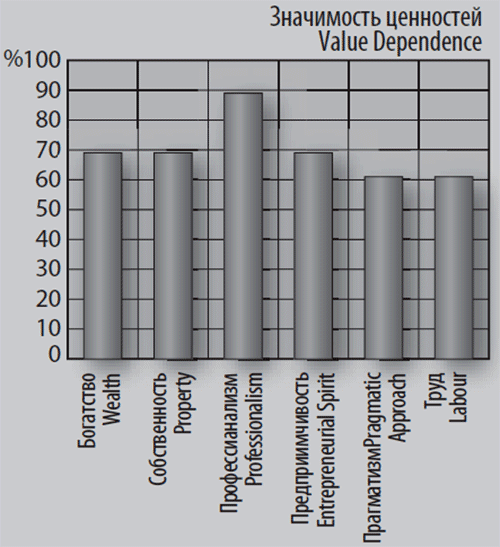
Fig. 1. Values of modern Saratov entrepreneurs.
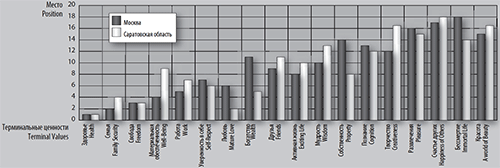
Fig. 2. Comparative data on terminal values in Saratov and Moscow entrepreneurs.
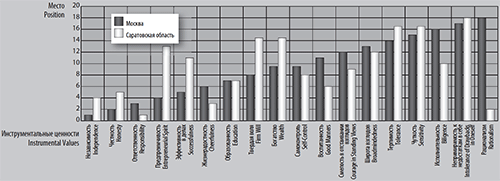
Fig. 3. Comparative data on instrumental values in Saratov and Moscow entrepreneurs.
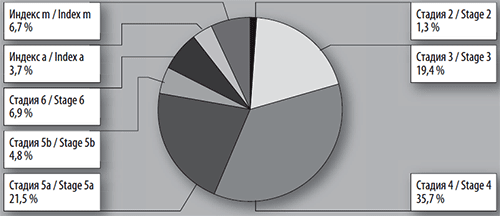
Fig. 4. Level of moral consciousness stages development (per cent)
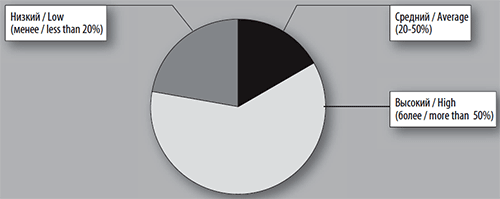
Fig. 5. Level of importance of moral consciousness principles in decision making.
References:
Abysheva, Yu.Yu. (2005) The issue of building the city image: the socio-administrative aspect: Ph.D. in Sociology, thasis. Nizhny Novgorod, 23.
Aksenovskaya, L.N. (2016) The subculture of self-employed citizens in the structure of the organizational culture of the Russian geographical region: the prospect of building countercultural tendencies precariat. [Organizatsionnaya psikhologiya: lyudi i riski: sbornik materialov 7oy mezhdunarodnoy nauchno-prakticheskoy konferentsii (19-20 oktyabrya 2016 g.)]. Saratov, ITs «Nauka», 11-19.
Aksenovskaya, L. N. (2016) Ethical and Semantic System and Emotional intelligence/ International Annual Edition of Applied Psychology: Theory, Research, and Practice. Volume 3. Retrieved from: http://interpsy.sgu.ru/ (reference date 11/06/2016).
Aksenovskaya, L.N., & Bazarov, T.Yu. (2008) Managing the organizational culture. [Rossiyskiy psikhologicheskiy zhurnal]. Vol. 5, 2, 9-17.
Bazarov, T.Yu. (2016) Stolypin’s reforms in the context of the time transspective: Past, Present and Future. [Organizatsionnaya psikhologiya: lyudi i riski: sbornik materialov 7oy mezhdunarodnoy nauchno-prakticheskoy konferentsii (19-20 oktyabrya 2016 g.)]. Saratov, ITs «Nauka», 4-11.
Bazarov, T. & Konyaeva, A. (2012) Organizational Psychology: the transition from service managers to partnership with entrepreneurs. Experience in empirical research and analysis of their own practice. [Organizatsionnaya psikhologiya]. Vol. 2, 1, 42-57.
Bazarov, T.Yu., & Shevchenko, Yu.S. (2014) Organizing leader of the post-crisis period. [Organizatsionnaya psikhologiya]. Vol. 4, 3, 69-86.
Fritzsche, D. (2002) Business ethics. Moscow, Olimp-Biznes, 336.
Frolova, S.V. (2017) Socio-cognitive foundation of psychological commitment to the native country. Moscow, Academicheskiy Proyekt, 153.
Gritskevich, T.I. (2009) Reformer: social role or particular personality traits? [Vestnik VGU]. Series Philosophy. 2, 140-148.
Ivanova, Yu.V., & Russkikh, A.A. (2016) Value orientations of Russian entrepreneurs (based on Saratov and Saratov region research). [Organizatsionnaya psikhologiya: lyudi i riski: sbornik materialov 7oy mezhdunarodnoy nauchno-prakticheskoy konferentsii (19-20 oktyabrya 2016 g.)]. Saratov, ITs «Nauka», 32-36.
Kohlberg, L. (1973) Continuities in Childhood and Adult Moral Development Revisited. In: Lite-Span Developmental Psychology. Personality and Socialization/ (Eds.) P.B. Baltes, & K.W.Schaie, N.Y., 187. doi: 10.1016/b978-0-12-077150-9.50014-9
Kravtsova, A.K., Krikun, S., & Ulyanina, A. et al. personality, group, environment. Past, Present and Future. [Organizatsionnaya psikhologiya: lyudi i riski: sbornik materialov 7oy mezhdunarodnoy nauchno-prakticheskoy konferentsii (19-20 oktyabrya 2016 g.)]. Saratov, ITs «Nauka», 50-75.
Lyul’ko, A.N. (2011) Conceptual aspects of building the city image. [Vlast’]. 8. Retrieved from: http://cyberleninka.ru/article/n/imidzh-goroda-i-faktory-vliyayuschie-na-ego- (reference date 11/06/2016).
Makeyeva, V.G. (2002) Enterprise culture: Textbook for students of economy. Moscow, INFRA-M, 217.
Molchanov, S.V. (2011) Moral justice and ethics concerns: foreign and domestic approaches to moral development. [Vestnik Moskovskogo universiteta]. Series 14. Psychology. 2, 59-72.
Nesterova, K.S., Romanenko, N.G., & Ananiev, D.S. et al. (2016) The moral consciousness as an aspect of the ethical-deterministic behaviour of contemporary Saratov entrepreneurs. [Organizatsionnaya psikhologiya: lyudi i riski: sbornik materialov 7oy mezhdunarodnoy nauchno-prakticheskoy konferentsii (19-20 oktyabrya 2016 g.)]. Saratov, ITs «Nauka», 83-91.
Ponukalin, A.A., Askerova, M., & Kiskin, K. Pyotr Stolypin: reformer and (or) innovator? (Socio-psychological analysis). [Organizatsionnaya psikhologiya: lyudi i riski: sbornik materialov 7oy mezhdunarodnoy nauchno-prakticheskoy konferentsii (19-20 oktyabrya 2016 g.)]. Saratov, ITs «Nauka», 96-104.
Putintsev, P.A. (2011) Design Principles for the city image. [Vestnik Chelyabinskogo gosudarstvennogo universiteta]. 13 (228), Vol. 54, 171-176.
Rest, James (1986) DIT Manual. Manual for the study of the Defining Issues Test. Third edition, 8/90 revision/Center for the study of Ethical Development. University of Minnesota.
Zhdanova, A.A., Zhizhina, M.V., & Lashova, E.A. et al. (2016) The image of Saratov entrepreneur in the representation of citizens. [Organizatsionnaya psikhologiya: lyudi i riski: sbornik materialov 7oy mezhdunarodnoy nauchno-prakticheskoy konferentsii (19-20 oktyabrya 2016 g.)]. Saratov, ITs «Nauka», 19-24.
Zhizhina, M.V., Konstantinov, E.N., & Serov, M.O. et al. (2016) The representations about the image of Saratov citizens. [Organizatsionnaya psikhologiya: lyudi i riski: sbornik materialov 7oy mezhdunarodnoy nauchno-prakticheskoy konferentsii (19-20 oktyabrya 2016 g.)]. Saratov, ITs «Nauka», 24-32.
Zhizhina, M.V. (2016) Media psychology: theory and practice of media conduct. Moscow, Vuzovskaya kniga, 376.
Zhuravlev, A.L., & Poznyakov, V.P. (2012) Social Ppsychology of the Russian business: the concept of psychological relations. Moscow, Izdatel’stvo «Institut psikhologii RAN». 480.
For citing this article:
Bazarov T.Yu., Aksenovskaya L.N. (2016). Socio-psychological technology of building entrepreneurial culture of the geographical region representatives in Russia. National Psychological Journal. 4, 87-97.


